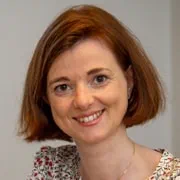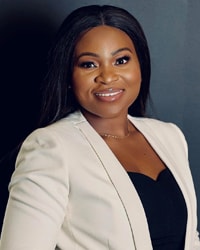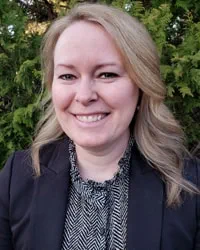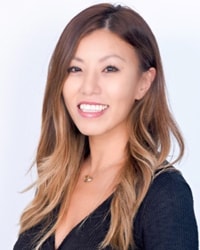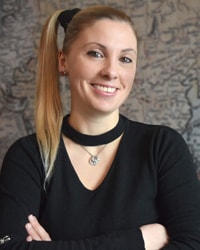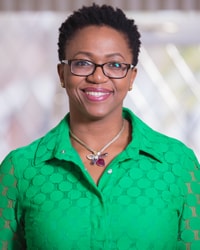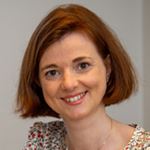This year’s International Women’s Day theme could not be a more apt description of what the strong women who work at Arcadis do on a daily basis.
When I look across our company, I see women who #BreakTheBias in the projects we deliver for clients and in their personal lives. I’m proud to lead a company with so many women who are redefining what it means to be an engineer, a project planner, a sustainability specialist, a business leader, or any of the many of roles within the natural and built environment, which have traditionally been held by men.
We know that we don’t yet live in a gender equal world. Women have to confront bias, stereotypes, and discrimination, throughout their careers. But we also know that working together, we can create a world free of gender bias and that this will be a world that is much better to live in, not just for women, but for everyone.
Getting from here to there won’t be easy but raising awareness against discrimination and celebrating what women have achieved, in spite of the bias they face, are things we can do to help move us in the right direction. That’s why it’s my honor to introduce you to some of the incredible women who work at Arcadis and to share some of their stories of achievement and what they have done to #BreakTheBias. I hope you will take the time to read about these powerful women and will be as inspired by their stories as I am.
Oluwabukola Esho
Sustainability Consultant
Oluwabukola is Nigerian and grew up in Lagos, with her parents and three brothers. She went on to earn her bachelor’s degree in Civil and Environmental Engineering from the University of Lagos. Six years ago, she moved to the United States to study for a master’s degree in Environmental Engineering and Business Management from Texas A&M University, College Station. Oluwabukola says she loves to solve problems, which is what drove her to become an engineer and to work directly to help solve one of humanity’s most basic problems, namely, dealing with water. She learned about Arcadis while in graduate school, when an Arcadian came to speak at the Environmental Engineering Students’ Association she had joined. This led her to join the company: first as a water engineer before transitioning to sustainability advisory work.
When she started working, Bukky (as she is commonly known), like many people who are new to a profession, did not always feel confident enough to voice her opinion. But this was compounded by the fact that she was often the only woman at the table:
Early on in my career, I was part of a team, predominantly made up of men, which was scary for me as a recent graduate. I remember being subtly shut down a couple of times during project meetings. I didn’t have an opportunity to have my thoughts and opinions taken into consideration. At the time, I thought it was normal, given that I was new to the profession, but in hindsight, I think I should have tried harder to have my voice heard. I discussed this issue with a few close friends, but I was not bold enough to say anything to my fellow team members. One thing I know for sure now is that if such a situation should come up again, I will definitely find a way to have my voice heard and to make sure others have to consider my point of view.
Like so many ambitious women, Bukky was confronted with gender bias early on in her career. But this has not stopped her from believing that we can benefit from a world with gender equality.
In a world where stereotypes are gotten rid of, the opinions of women will truly be taken into consideration in every important decision-making process. Women would also have equal access to positions of power, opportunities, and resources, regardless of their geographical location. When this happens, I think we’ll see an increase in economic prosperity as well as safer and healthier societies.
I asked Bukky what message she’d like to send back in time to her younger self, who was just starting her career in engineering:
I would tell my younger self to go for what she wants and expunge the fear of rejection. I would tell my younger self not to be afraid to explore different opportunities, because she thinks that her gender will be a hinderance. I would tell my younger self to be very confident in who she is because there is great power in that. Finally, I would tell my younger self to live a life that is true to herself and not what is expected of her because of her gender.
Brooke Bonkoski
Business Area Director for North America Resilience – Environment
Brooke is an outgoing leader who is passionate about supporting and mentoring fellow Arcadians. She has been with Arcadis for 18 years, starting as a civil engineer on a technical remediation track, striving to improve the world around her. She lives in Portland, Oregon in the United States, with her husband and two children.
Brooke has had to deal with gender bias throughout her career. Engineering being a male-dominated field and also one in which there have traditionally not been many female leaders, Brooke has been confronted with biases about how she looks, speaks, and acts. During her two pregnancies, she faced a new set of gender biases. She had men tell her that she would “feel differently” about work after the birth of her first child and that she needed to be mindful that her decisions about when and how to return to work would impact her career trajectory. Luckily, when faced with this ignorance, she had people who supported her in moving beyond it.
During both of my pregnancies, I had advocates (both men and women) who counteracted that narrative and gave me opportunities regardless of those biases, which also helped me to feel accepted as part of the team.
Brooke says she sees clear benefits that we could all reap if we could establish real gender equality and address intersectionality, including sexual orientation, race, ethnicity, and neurodiversity. For Brooke, it’s clear that the demonstrable lack of diversity in the engineering industry is a real problem.
We’re missing out on real talent and contributions because historically marginalized groups have been confronted with bias again and again that reinforces to them that they can’t succeed in engineering or can’t succeed in leadership. If we could remove those biases, stereotypes, and discrimination, we could unlock a lot of additional potential, and allow all people to thrive and grow within the industry.
And when it comes to the advice she’d offer, for Brooke, it’s all about the need for women to work together to combat gender bias and support each other’s achievements.
Know your abilities and strengths and recognize that the way in which you are different from those around you is an asset, not a limitation. Most importantly as women, we need to support and elevate each other. Because there’s a lack of women in our industry, we often end up in a position where we feel like our competition is other women. I set out every day to listen to, support, elevate, and magnify the voices of those who have been historically marginalized because, I know that we are better together.
Penny Murphy
Global Workstyle Transformation Director
Penny Murphy is our Global Workstyle Transformation Director, based in Singapore and has been with our company for six and a half years. Though she was born and raised in the UK, in her twenties, Penny saw opportunities she wanted to pursue in Asia and decided to relocate. She’s also lived in China and Hong Kong. She’s leading the project to deliver our workstyle promise, which will shape our future company culture, in terms of the way we will work at Arcadis.
Penny says that she was drawn to our company because of the many impactful projects we do, but what sold her on joining the company was much more personal. When she was interviewing for her first role, she’d just given birth to her son and was nervous about this in the context of taking up a leadership position at a new company. So, she specifically asked whether this would be a problem and the response was simple: “It’s not a problem for us, if it’s not a problem for you.” Penny says that when she heard this, she accepted the job on the spot.
Although Arcadis proved to be an environment in which she could combine her work ambitions with her private life, there were still times in which she had to push back against stereotypes and erroneous assumptions about her based on her gender.
I remember that when I stepped into a role to lead our Asia digital transformation, and I had a very different profile from my predecessor. The team I inherited, and also other colleagues, made presumptions about me based on my gender. I experienced comments such as “You are not technical enough, a male manager would understand this”, or in meetings I had to ensure my voice was heard and not talked over. Of course, I be lying if I said it didn’t affect me. There were many times I came home and discussed things with my husband and gauged his advice on how to handle these issues. At times, I also had conversations with male allies at work. It really helped to have a male perspective and to move past thoughts about how these experiences affected me and then to see them as an opportunity to reshape what gender balance should look like.
Penny has a clear vision of a gender-balanced world. It’s one in which there would no longer be a need for a specific focus on gender issues:
In 2020, I was awarded 'Digital Transformation, APAC Female Leader of the Year' by Women in IT - a big event held annually to celebrate women in leadership. Whilst I am immensely proud of this and met many wonderful female leaders, who shared similar experiences and I now have a strong network to rely on, I also believe that in a gender-equal world, one day we will be able to do away with celebrating these types of awards, specifically based on gender. I truly believe that a gender-balanced world should be based solely on merit and capabilities. The benefits would be plentiful. It would be a world where skills alone are the measure of good leadership and what inspires others.
Penny has some great advice to other women out there, about how being grounded in your own principles can help you overcome gender bias:
My advice would be to stay true to what makes you a leader but also accept that this may mean that you use a softer set of skills. My leadership mantra is “Always care, commit and be creative in all you do.” This has kept me strong during times when I experienced gender bias. It allowed me to be brave in challenging things when I saw them – but not through a gender lens- I challenged based on my values of what a leader is; which gave me something to anchor myself to. Gender bias will happen. When it does, remind yourself it is not personal and that this is an opportunity to disprove the bias you are experiencing…. which is why being clear about your leadership values is important.
Silvia Gioja
Building Information Modeling (BIM) Lead Mobility, Arcadis Belgium
Silvia is a building engineer and architect from Tivoli, which is right outside of Rome, in Italy. She’s had experience working in Italy, Qatar, and Belgium, where she moved to in 2017. Over the years, Silvia has developed a specialization in tunnels, metro lines, bridges, and road projects. In fact, in 2021, she became the first Italian woman to win the Women in Construction and Engineering award for “Best Woman in Tunnelling and Underground Construction.” She has also been nominated as one of the three best women in construction, in contention to win a Belgian Construction Award.
Silvia says she decided to join Arcadis back in 2018 largely because of our company’s culture of putting our people first, but also because of what she saw as a business that really values diversity. Over the time she’s been with the company, she says she’s seen how Arcadis has empowered employees grow their careers while still having a positive work-life balance.
In just three years, I progressed from a role as BIM Coordinator (managing 3D models of renovations of tunnels in Flanders, in order to better design and maintain these assets) to BIM Lead for Belgium’s Mobility team. A BIM (Building Information Modeling) Lead plays a key role on the development of a digital way of working in a company, having responsibility inside a discipline group of a country, and acting as an interface between that region that they lead and the global level. During this time, I became a mother, but I was able to grow my career while meeting the obligations of caring for a newborn. So, I felt sure I could even have a second child without having any problems with the balance between my professional and private life.
Earlier in her career, Silvia experienced blatant sexism in the workplace. She recalls once having a boss who very clearly expected far more work from his female employees. During this period, she was working 12 to 15-hour days, with no lunch breaks, while her male counterparts worked far fewer hours. This situation was so bad that it drove Silvia to expand her horizons.
Women with children were treated badly because they had to leave work early to pick up their children from school. Many quit or were fired because they were unable to balance work and private life. There was no way I could have children in that situation. I am an ambitious woman, and I would not have given up on my career. But I also did want to start a family one day. My determination and positivity took over from the initial feeling of not being able to do anything to improve the situation and to make my dreams come true. This led me to look for work opportunities outside of my home country. That decision led to the successes I have achieved but, unfortunately, I had to move away from my family who live in Italy.
When Silvia imagines what a gender equal world would be like, she sees many possibilities for the global economy, as she believes discrimination stifles opportunity and is a drag on prosperity:
I would say that a gender equal world would also be a happier world, with less stressed and frustrated people. And happy employees, happy customers. If you hire great talent, within a diverse team with open world view, you have a great team to execute your strategy and to satisfy your customers’ needs.
And finally, when I asked Silvia what advice she’d give to her younger self, she had this to say:
I would tell myself to not work extreme hours under bad conditions like I did at the beginning of my career. No one will ever give me that time back. I would also tell myself to not be afraid of nasty comments or discrimination from co-workers because these have no value. I would tell myself to enjoy the moment and appreciate family. I would tell her that life can be difficult at times but that she should have confidence that she will always overcome these hardships. And to young women out there, I would say, don’t be afraid to leave your comfort zone if you feel that doing so could help you achieve more. Even if it doesn’t work out the way you planned, you will be a stronger person because of the effort.
Tonye Adenusi
Associate Project Manager, Rail Consultancy
Tonye grew up in Nigeria but moved to the UK in her twenties. She is a member of the Arcadis UK Risk team. She’s a voracious reader and an avid writer. She recently published her first novel, Karina, which showcases some of the mental health challenges women can face during their lives. When Tonye isn’t being a risk manager or writing, she spends her time with her four delightful children. Tonye says she has always been fascinated with the way things work and this led her to want to work in infrastructure. Perhaps not surprisingly, given her love of storytelling, Tonye believes that the built environment speaks to us and tells us stories. Unfortunately, her positive outlook on life and drive to help people feel empowered, didn’t shield Tonye from sexism:
During the course of one commission, I built up and led an all-male team. I found that on various occasions, while facilitating workshops, some of the clients would either refuse to address me or they would speak condescendingly towards me. On one occasion, the men in the room insisted on directing their responses to questions I had asked them to my junior, male colleague, rather than myself. That colleague was clearly uncomfortable with the situation and asked them to direct their questions to me. One of the delegates shut down and wouldn’t engage with me. It made me feel angry and disappointed to be treated with such contempt, however, as a strong Black woman, I have learned to remain calmly professional under such circumstances. In that instance, I took a break to regroup and spoke to the most senior person in the room about my concerns, which he apologized for.
Though Tonye has always found ways to stay calm and persevere in the face of sexism, this hasn’t always been easy, and she thinks that in a world free of sexism, women would no longer feel the burden of remaining composed in these situations:
I think a gender equal world would be free from faulty assumptions about a person’s abilities based solely on their gender. This would reduce the amount of stress and abuse that is rife in the world we live in today. People would feel more appreciated and comfortable to bring their whole selves to work and in every other aspect of their lives, without fear or not living up to expectations or being put down for it. Instead, I believe that people will play to their strengths and be appreciated for that.
And I was inspired by the advice Tonye said she’d send to her younger self and other young women out there:
I would tell my younger self to not be afraid of who she is. Recognizing that there is perfection in our imperfections can be a powerful thing and is something I tell myself and my kids often. I am blessed to have strong women around me in my mum and my siblings, and a dad, who empowered us to fight for what was right and what we believed in, no matter the cost. Above all, I would say to women what I tell my girls – no man or woman has the right to determine your worth. If their bias gets in your way, find a way around them and keep moving.


